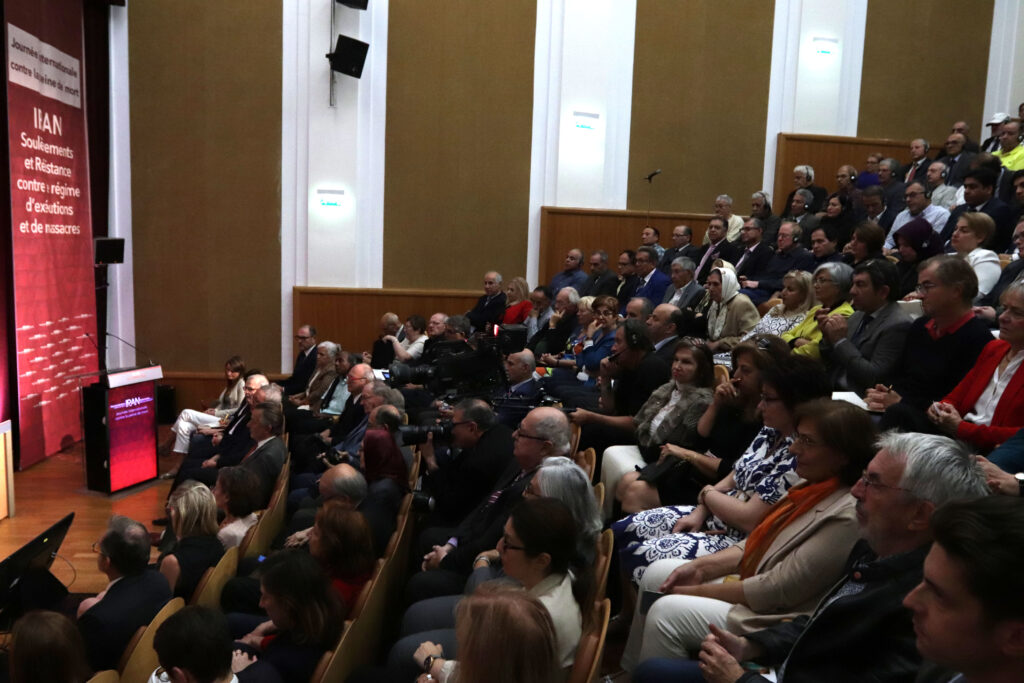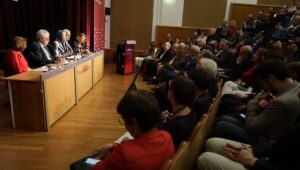
On Wednesday, 11 October, a parliamentary conference took place in Paris, commemorating World Day against the Death Penalty. Titled “Rising Up and Resisting the Regime of Executions and Massacre,” the event was attended by members of the French National Assembly and distinguished dignitaries.
The primary objective of this conference was to shed light on the issue of the death penalty and emphasize the urgent necessity of opposing its continued use on a global scale. The event served as a platform for raising awareness and fostering discussions on these vital matters.
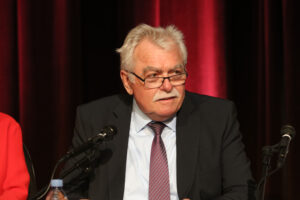 André Chassaigne, leader of the Communist bloc within the French National Assembly and a deputy of the Parliamentary Committee for Democratic Iran (Comité Parlementaire pour un Iran Démocratique – CPID), underlined the activities of the Resistance Units against clerical rule in Iran. These units, affiliated with the People’s Mojahedin Organisation of Iran (PMOI/MEK), despite the repression experienced during the anniversary of the uprising in Tehran and in 40 other Iranian cities, carried out over 414 operations across the country. Mr. Chassaigne stressed that these units are the sole unified force actively engaged in the cause. He also pointed out that, in Iran, the death penalty is not just a judicial tool or a harsh form of punishment; it serves as a political instrument for the widespread suppression.
André Chassaigne, leader of the Communist bloc within the French National Assembly and a deputy of the Parliamentary Committee for Democratic Iran (Comité Parlementaire pour un Iran Démocratique – CPID), underlined the activities of the Resistance Units against clerical rule in Iran. These units, affiliated with the People’s Mojahedin Organisation of Iran (PMOI/MEK), despite the repression experienced during the anniversary of the uprising in Tehran and in 40 other Iranian cities, carried out over 414 operations across the country. Mr. Chassaigne stressed that these units are the sole unified force actively engaged in the cause. He also pointed out that, in Iran, the death penalty is not just a judicial tool or a harsh form of punishment; it serves as a political instrument for the widespread suppression.
Ms. Marietta Karamanli, a member of the National Assembly representing the Socialist Party and a former rapporteur of the European Council on death sentences, emphasized the need for France to consistently address execution-related issues in the National Assembly and the Senate. She stressed that the struggle against these inhumane crimes is ongoing and should be highlighted to demonstrate global opposition to such practices.
President-elect of the National Council of Resistance of Iran (NCRI), Mrs. Maryam Rajavi, addressed the conference by emphasizing the imperative for the world to confront the aggressive actions of the Iranian regime, particularly their exploitation of the Palestinian issue for their own ends. Mrs. Rajavi underscored that the right course of action is to counter the regime in Tehran, known as the primary state sponsor of terrorism and instigator of conflicts.
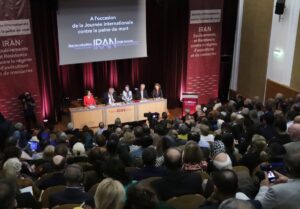
Furthermore, she advocated for the strengthening of sanctions to curtail the regime’s access to European markets and educational institutions, which they exploit to advance their weapon and repression-related objectives. Mrs. Rajavi also stressed the importance of restoring UN Security Council resolutions pertaining to the regime’s nuclear a
ctivities, and she urged the inclusion of the Islamic Revolutionary Guard Corps (IRGC) in the list of recognized terrorist organizations.
Mr. Émile Blessig, a former member of the National Assembly, and one of the founders of CPID, emphasized that the world cannot remain indifferent in the face of the increasing number of executions in Iran. Those responsible for executions, torture, and human rights violations in Iran, especially the Revolutionary Guards, should be aware that they will be held accountable. By supporting the Iranian people’s struggle, we are also advocating for global peace.
Philippe Gosselin, deputy head of CPID, drew parallels with General de Gaulle and declared that, on this international day against executions, the flame of resistance ignited should never be extinguished. He reaffirmed the collective commitment to preserving this flame and achieving victory for freedom, for Iran, and for its people.
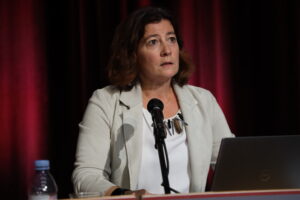 MP Cécile Rilhac, a representative of the majority faction (Renaissance) and the head of CPID, acknowledged the initiative taken by the parliamentary committee in supporting the Iranian people’s quest for a democratic republic, marked by a clear separation of religion and state. Denouncing advocates of appeasement policy with the Iranian regime or those seeking the return of the previous dictatorship, he underlined the committee’s support the Iranian people’s pursuit of democracy.
MP Cécile Rilhac, a representative of the majority faction (Renaissance) and the head of CPID, acknowledged the initiative taken by the parliamentary committee in supporting the Iranian people’s quest for a democratic republic, marked by a clear separation of religion and state. Denouncing advocates of appeasement policy with the Iranian regime or those seeking the return of the previous dictatorship, he underlined the committee’s support the Iranian people’s pursuit of democracy.
Ms. Dominique Attias, the head of the Administrative Council of the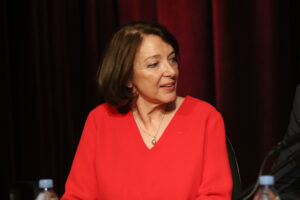 European Lawyers’ Foundation and former head of the Paris Bar Association and the European Lawyers’ Federation, emphasized the role of Ebrahim Raisi, the Iranian regime’s president, in the massacre of 30,000 prisoners in the summer of 1988. She underscored the direct connection between the call for the abolition of executions and the principles of modern democracy. Ms. Attias cited Mrs. Rajavi’s persistent advocacy for ending executions since 2006 in her Ten-Point Plan.
European Lawyers’ Foundation and former head of the Paris Bar Association and the European Lawyers’ Federation, emphasized the role of Ebrahim Raisi, the Iranian regime’s president, in the massacre of 30,000 prisoners in the summer of 1988. She underscored the direct connection between the call for the abolition of executions and the principles of modern democracy. Ms. Attias cited Mrs. Rajavi’s persistent advocacy for ending executions since 2006 in her Ten-Point Plan.
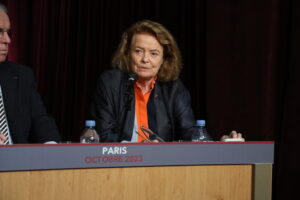 Professor Aude de Thuin, former president of the Supreme Education Union emphasized that the struggle in Iran encompasses fundamental human rights, extending beyond the issue of the hijab. Professor de Thuin highlighted the burgeoning revolution of Iranian women, irrespective of their head coverings.
Professor Aude de Thuin, former president of the Supreme Education Union emphasized that the struggle in Iran encompasses fundamental human rights, extending beyond the issue of the hijab. Professor de Thuin highlighted the burgeoning revolution of Iranian women, irrespective of their head coverings.
Jean-François Legaret, former mayor of Paris’s first district and president of the Foundation for Middle East Studies, applauded the MEK for its resilience in the face of severe repression. He commended the organization for their unwavering efforts.
Jacques Boutault, a unionist in the educational and university sector, stressed that the struggle for a democratic Iran is pivotal for the future of humanity and freedom worldwide.
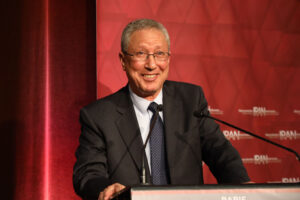 Tahar Boumedra, heading the committee for Justice for the Victims of the 1988 Massacre (JVMI) in Iran, former Regional Director of Penal Reform International (PRI) for MENA, and former Chief of the UN Human Rights Office in Iraq, emphasized the urgent need for the prosecution and trial of Iranian regime president Ebrahim Raisi due to his direct involvement in extrajudicial executions of thousands of political prisoners. He also highlighted the alarming rise in executions in Iran, despite global progress towards the abolition of the death penalty.
Tahar Boumedra, heading the committee for Justice for the Victims of the 1988 Massacre (JVMI) in Iran, former Regional Director of Penal Reform International (PRI) for MENA, and former Chief of the UN Human Rights Office in Iraq, emphasized the urgent need for the prosecution and trial of Iranian regime president Ebrahim Raisi due to his direct involvement in extrajudicial executions of thousands of political prisoners. He also highlighted the alarming rise in executions in Iran, despite global progress towards the abolition of the death penalty.

